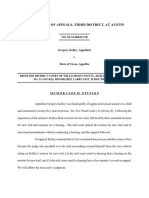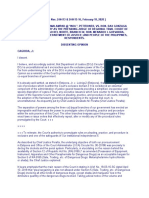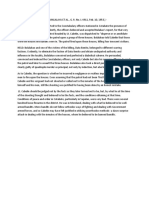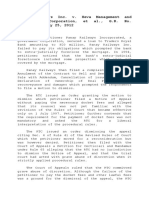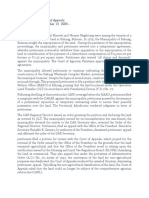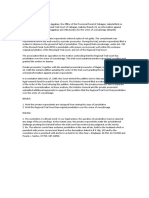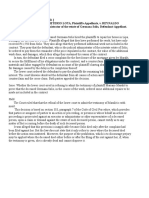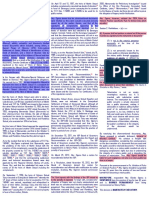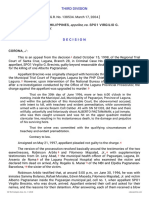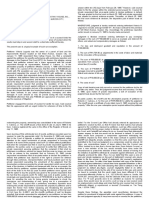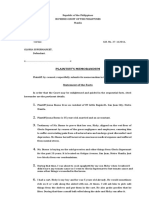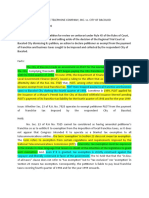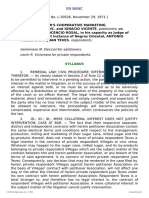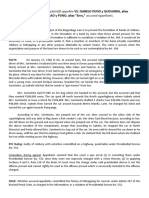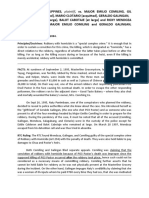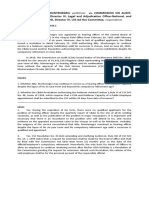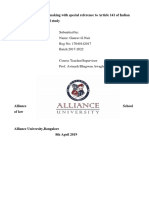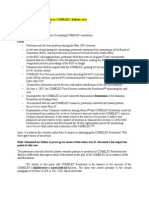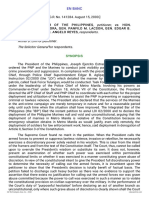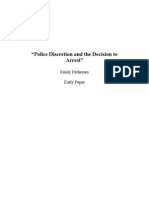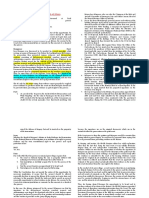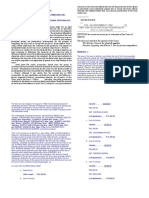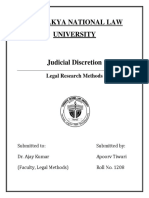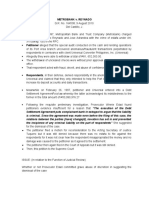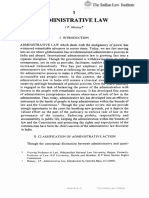0 ratings0% found this document useful (0 votes)
100 viewsPetitioner Respondents: Danilo Calivo Cariaga, Emmanuel D. Sapigao and Ginalyn C. Acosta
Petitioner Respondents: Danilo Calivo Cariaga, Emmanuel D. Sapigao and Ginalyn C. Acosta
Uploaded by
mei atienzaThis document summarizes a Supreme Court decision regarding a petition for review of lower court rulings dismissing a complaint of falsification of public documents and related charges. The lower courts found that entries made in a barangay blotter describing incidents involving the petitioner were made in good faith and based on the respondents' personal knowledge, and that the petitioner did not prove the entries were false. The Supreme Court denied the petition, finding that the petitioner did not first exhaust his administrative remedies by appealing an adverse regional prosecutor ruling to the Secretary of Justice, as required.
Copyright:
© All Rights Reserved
Available Formats
Download as PDF, TXT or read online from Scribd
Petitioner Respondents: Danilo Calivo Cariaga, Emmanuel D. Sapigao and Ginalyn C. Acosta
Petitioner Respondents: Danilo Calivo Cariaga, Emmanuel D. Sapigao and Ginalyn C. Acosta
Uploaded by
mei atienza0 ratings0% found this document useful (0 votes)
100 views9 pagesThis document summarizes a Supreme Court decision regarding a petition for review of lower court rulings dismissing a complaint of falsification of public documents and related charges. The lower courts found that entries made in a barangay blotter describing incidents involving the petitioner were made in good faith and based on the respondents' personal knowledge, and that the petitioner did not prove the entries were false. The Supreme Court denied the petition, finding that the petitioner did not first exhaust his administrative remedies by appealing an adverse regional prosecutor ruling to the Secretary of Justice, as required.
Original Title
12 Cariaga v. Sapigao
Copyright
© © All Rights Reserved
Available Formats
PDF, TXT or read online from Scribd
Share this document
Did you find this document useful?
Is this content inappropriate?
This document summarizes a Supreme Court decision regarding a petition for review of lower court rulings dismissing a complaint of falsification of public documents and related charges. The lower courts found that entries made in a barangay blotter describing incidents involving the petitioner were made in good faith and based on the respondents' personal knowledge, and that the petitioner did not prove the entries were false. The Supreme Court denied the petition, finding that the petitioner did not first exhaust his administrative remedies by appealing an adverse regional prosecutor ruling to the Secretary of Justice, as required.
Copyright:
© All Rights Reserved
Available Formats
Download as PDF, TXT or read online from Scribd
Download as pdf or txt
0 ratings0% found this document useful (0 votes)
100 views9 pagesPetitioner Respondents: Danilo Calivo Cariaga, Emmanuel D. Sapigao and Ginalyn C. Acosta
Petitioner Respondents: Danilo Calivo Cariaga, Emmanuel D. Sapigao and Ginalyn C. Acosta
Uploaded by
mei atienzaThis document summarizes a Supreme Court decision regarding a petition for review of lower court rulings dismissing a complaint of falsification of public documents and related charges. The lower courts found that entries made in a barangay blotter describing incidents involving the petitioner were made in good faith and based on the respondents' personal knowledge, and that the petitioner did not prove the entries were false. The Supreme Court denied the petition, finding that the petitioner did not first exhaust his administrative remedies by appealing an adverse regional prosecutor ruling to the Secretary of Justice, as required.
Copyright:
© All Rights Reserved
Available Formats
Download as PDF, TXT or read online from Scribd
Download as pdf or txt
You are on page 1of 9
FIRST DIVISION
[G.R. No. 223844. June 28, 2017.]
DANILO CALIVO CARIAGA, petitioner, vs. EMMANUEL D.
SAPIGAO and GINALYN C. ACOSTA, respondents.
DECISION
PERLAS-BERNABE, J : p
Assailed in this petition for review on certiorari 1 are the Resolutions
dated June 17, 2015 2 and March 17, 2016 3 of the Court of Appeals (CA) in
CA-G.R. SP No. 140206 dismissing petitioner Danilo Calivo Cariaga's
(Cariaga) petition for review 4 before it on the ground of non-exhaustion of
administrative remedies.
The Facts
The instant case stemmed from a Complaint Affidavit 5 filed by Cariaga
before the Office of the Provincial Prosecutor (OPP)-Urdaneta City,
Pangasinan accusing respondents Emmanuel D. Sapigao (Sapigao) and
Ginalyn C. Acosta (Acosta; collectively, respondents) of the crimes of
Falsification of Public Documents, False Certification, and Slander by Deed,
defined and penalized under Articles 171, 174, and 359 of the Revised Penal
Code (RPC). In the said complaint, Cariaga alleged that respondents, in their
respective capacities as Barangay Chairman and Secretary of Brgy.
Carosucan Sur, Asingan, Pangasinan, made two (2) spurious entries in the
barangay blotter, i.e., (a) Entry No. 00054 6 dated August 3, 2012 7 stating
that an unnamed resident reported that someone was firing a gun inside
Cariaga's compound, and that when Sapigao went thereat, he was able to
confirm that the gunfire came from inside the compound and was directed
towards the adjacent ricefields; and (b) Entry No. 00057 8 dated September
26, 2012 stating that a concerned but unnamed resident reported to
Sapigao that Cariaga and his companions attended the funeral march of
former Kagawad Rodrigo Calivo, Sr. (Calivo, Sr.) with firearms visibly tucked
in their waists (blotter entries). According to Cariaga, the police authorities
used the blotter entries to obtain a warrant for the search and seizure
operation made inside his residence and cattle farm on December 18, 2012.
While such operation resulted in the confiscation of a firearm and several
ammunitions, the criminal case for illegal possession of firearms
consequently filed against him was dismissed by the Regional Trial Court of
Urdaneta City. 9 Claiming that the statements in the blotter entries were
completely false and were made to dishonor and discredit him, Cariaga filed
the said complaint, docketed as NPS-I-01e-INV-14B-00084. 10
In his defense, 11 Sapigao denied the accusations against him,
maintaining that the blotter entries were true, as he personally witnessed
CD Technologies Asia, Inc. © 2021 cdasiaonline.com
their details. In this regard, he presented the Joint Affidavit 12 executed by
Barangay Kagawads Elpidio Cariaga, Metrinio Dela Cruz, Greg Turalba, and
Ex-Barangay Kagawad Jaime Aguida attesting that: (a) during the funeral
march of Calivo, Sr., they observed that Cariaga and his employees had
handguns tucked into their waists; and (b) the firing of guns was a common
occurrence in Cariaga's farm. 13 For her part, 14 Acosta averred that she was
merely performing her duties as Barangay Secretary when she certified as
true copies the photocopies of the aforesaid blotter entries requested by the
police authorities. 15
The OPP's Ruling
In a Resolution 16 dated April 10, 2014, the OPP dismissed the
complaint for lack of probable cause. It found that the questioned blotter
entries were all made in good faith and merely for recording purposes; done
in the performance of respondents' official duties; and based on personal
knowledge of what actually transpired. In this relation, the OPP pointed out
that Cariaga's complaint and supporting affidavits, which mainly consist of a
general and blanket denial of the incidents described in the blotter entries,
could not prevail over the positive and categorical testimonies of Sapigao
and his witnesses. 17
Cariaga moved for reconsideration 18 which was, however, denied in a
Resolution 19 dated July 28, 2014. Aggrieved, he filed a petition for review 20
before the Office of the Regional State Prosecutor (ORSP)-Urdaneta City,
Pangasinan. 21
The ORSP's Ruling
In a Resolution 22 dated January 5, 2015, the ORSP affirmed the OPP's
ruling. The ORSP found that absent any showing of ill-motive on
respondents' part in making the blotter entries, there can be no basis to
charge them of Falsification of Private Documents. This is especially so as
the statements therein were supported by testimonies of several witnesses,
and there is colorable truth to the same, since the search conducted by the
police authorities in Cariaga's home and cattle farm resulted in the seizure of
a firearm and several ammunitions and the eventual filing of a criminal case
against Cariaga for illegal possession of firearms. 23 Further, the ORSP ruled
that the blotter entries were not intended to malign, dishonor, nor defame
Cariaga; as such, respondents could not be said to have committed the
crime of Slander by Deed. 24 Finally, the ORSP pointed out that Acosta's
mere authentication of the photocopies of the blotter entries cannot be
equated to issuing a false certification so as to indict her of such crime. 25
Undaunted, Cariaga moved for reconsideration, 26 but the same was
denied in a Resolution 27 dated March 14, 2015. Thus, he filed a petition for
review 28 before the CA, docketed as CA-G.R. SP No. 140206.
The CA Ruling
In a Resolution 29 dated June 17, 2015, the CA dismissed Cariaga's
petition before it. It held that the ORSP is not the final authority in the
hierarchy of the National Prosecution Service, as one could still appeal an
CD Technologies Asia, Inc. © 2021 cdasiaonline.com
unfavorable ORSP ruling to the Secretary of Justice (SOJ). As such, Cariaga's
direct and immediate recourse to the CA to assail the ORSP ruling without
first filing a petition for review before the SOJ violated the principle of
exhaustion of administrative remedies. Thus, the dismissal of Cariaga's
petition for review is warranted. 30
Unperturbed, Cariaga filed a motion for reconsideration, 31 but it was
denied in a Resolution 32 dated March 17, 2016; hence, this petition.
The Issue Before the Court
The issue for the Court's resolution is whether or not the CA correctly
dismissed Cariaga's petition for review before it on the ground of non-
exhaustion of administrative remedies.
The Court's Ruling
The petition must be denied.
I.
To recapitulate, Cariaga's petition for review before the CA was
dismissed on the ground of non-exhaustion of administrative remedies as he
did not elevate the adverse ORSP ruling to the SOJ before availing of judicial
remedies.
The Department of Justice's (DOJ) Department Circular No. 70 33 dated
July 3, 2000, entitled the "2000 NPS Rule on Appeal," which governs the
appeals process in the National Prosecution Service (NPS), provides that
resolutions of, inter alia, the RSP, in cases subject of preliminary
investigation/reinvestigation shall be appealed by filing a verified petition for
review before the SOJ. 34 However, this procedure was immediately
amended by the DOJ's Department Circular No. 70-A 35 dated July 10, 2000,
entitled "Delegation of Authority to Regional State Prosecutors to Resolve
Appeals in Certain Cases," pertinent portions of which read:
DEPARTMENT CIRCULAR NO. 70-A
SUBJECT: Delegation of Authority to Regional State
Prosecutors to Resolve Appeals in Certain Cases
In order to expedite the disposition of appealed cases governed
by Department Circular No. 70 dated July 3, 2000 ("2000 NPS RULE
ON APPEAL"), all petitions for review of resolutions of
Provincial/City Prosecutors in cases cognizable by the
Metropolitan Trial Courts, Municipal Trial Courts and
Municipal Circuit Trial Courts , except in the National Capital
Region, shall be filed with the Regional State Prosecutor
concerned who shall resolve such petitions with finality in
accordance with the pertinent rules prescribed in the said
Department Circular.
The foregoing delegation of authority notwithstanding, the
Secretary of Justice may, pursuant to his power of supervision and
control over the entire National Prosecution Service and in the
interest of justice, review the resolutions of the Regional State
Prosecutors in appealed cases. (Emphases and underscoring
CD Technologies Asia, Inc. © 2021 cdasiaonline.com
supplied)
As may be gleaned above, Department Circular No. 70-A delegated to
the ORSPs the authority to rule with finality cases subject of preliminary
investigation/reinvestigation appealed before it, provided that: (a) the case is
not filed in the National Capital Region (NCR); and (b) the case, should it
proceed to the courts, is cognizable by the Metropolitan Trial Courts,
Municipal Trial Courts and Municipal Circuit Trial Courts (MeTCs, MTCs, and
MCTCs) — which includes not only violations of city or municipal ordinances,
but also all offenses punishable with imprisonment not exceeding six (6)
years, irrespective of the amount of fine, and regardless of other imposable
accessory or other penalties attached thereto. 36 This is, however, without
prejudice on the part of the SOJ to review the ORSP ruling should the former
deem it appropriate to do so in the interest of justice. The foregoing
amendment is further strengthened by a later issuance, i.e., Department
Circular No. 018-14 37 dated June 18, 2014, entitled "Revised Delegation of
Authority on Appealed Cases," pertinent portions of which read:
DEPARTMENT CIRCULAR NO. 018-14
SUBJECT: Revised Delegation of
Authority on Appealed Cases
In the interest of service and pursuant to the provisions of
existing laws with the objective of institutionalizing the Department's
Zero Backlog Program on appealed cases, the following guidelines
shall be observed and implemented in the resolution of appealed
cases on Petition for Review and Motions for Reconsideration:
1. Consistent with Department Circular No. 70-A, all appeals
from resolutions of Provincial or City Prosecutors, except
those from the National Capital Region, in cases cognizable
by the Metropolitan Trial Courts, Municipal Trial Courts and
Municipal Circuit Trial Courts, shall be by way of a petition
for review to the concerned province or city. The Regional
Prosecutor shall resolve the petition for review with finality,
in accordance with the rules prescribed in pertinent rules
and circulars of this Department. Provided, however, that
the Secretary of Justice may, pursuant to the power of
control and supervision over the entire National
Prosecution Service, review, modify or reverse, the
resolutions of the Regional Prosecutor in these appealed
cases.
2. Appeals from resolutions of Provincial or City Prosecutors,
except those from the National Capital Region, in all other
cases shall be by way of a petition for review to the Office
of Secretary of Justice.
3. Appeals from resolutions of the City Prosecutors in the
National Capital Region in cases cognizable by
Metropolitan Trial Courts shall be by way of a petition for
review to the Prosecutor General who shall decide the
same with finality. Provided, however that the Secretary of
Justice may, pursuant to the power of control and
supervision over the entire National Prosecution Service,
CD Technologies Asia, Inc. © 2021 cdasiaonline.com
review, modify or reverse, the resolutions of the Prosecutor
General in these appealed cases.
4. Appeals from resolutions of the City Prosecutors in the
National Capital Region in all other cases shall be by way of
a petition for review to the Office of the Secretary.
xxx xxx xxx
This Circular supersedes all inconsistent issuances, takes effect
on 01 July 2014 and shall remain in force until further orders.
For guidance and compliance.
A reading of the foregoing provisions shows that the prevailing appeals
process in the NPS with regard to complaints subject of preliminary
investigation would depend on two factors, namely: where the complaint
was filed, i.e., whether in the NCR or in the provinces; and which court has
original jurisdiction over the case, i.e., whether or not it is cognizable by the
MTCs/MeTCs/MCTCs. Thus, the rule shall be as follows:
(a) If the complaint is filed outside the NCR and is cognizable by the
MTCs/MeTCs/MCTCs, the ruling of the OPP may be appealable by
way of petition for review before the ORSP, which ruling shall be
with finality;
(b) If the complaint is filed outside the NCR and is not cognizable by
the MTCs/MeTCs/MCTCs, the ruling of the OPP may be appealable
by way of petition for review before SOJ, which ruling shall be
with finality;
(c) If the complaint is filed within the NCR and is cognizable by the
MTCs/MeTCs/MCTCs, the ruling of the OCP may be appealable by
way of petition for review before the Prosecutor General, whose
ruling shall be with finality;
(d) If the complaint is filed within the NCR and is not cognizable by
the MTCs/MeTCs/MCTCs, the ruling of the OCP may be appealable
by way of petition for review before the SOJ, whose ruling shall be
with finality;
(e) Provided, that in instances covered by (a) and (c), the SOJ may,
pursuant to his power of control and supervision over the entire
National Prosecution Service, review, modify, or reverse the
ruling of the ORSP or the Prosecutor General, as the case may be.
In the instant case, Cariaga filed a complaint before the OPP in
Pangasinan ( i.e., outside the NCR) accusing respondents of committing the
crimes of Falsification of Public Documents, False Certification, and Slander
by Deed, defined and penalized under Articles 171, 174, and 359 of the RPC.
Of the crimes charged, only False Certification and Slander by Deed are
cognizable by the MTCs/MeTCs/MCTCs, 38 while Falsification of Public
Documents is cognizable by the Regional Trial Courts. 39 Applying the
prevailing rule on the appeals process of the NPS, the ruling of the ORSP as
regards Falsification of Public Documents may still be appealed to the SOJ
before resort to the courts may be availed of. On the other hand, the ruling
CD Technologies Asia, Inc. © 2021 cdasiaonline.com
of the ORSP pertaining to False Certification and Slander by Deed should
already be deemed final — at least insofar as the NPS is concerned — and
thus, may already be elevated to the courts.
Verily, the CA erred in completely dismissing Cariaga's petition before
it on the ground of non-exhaustion of administrative remedies, as only the
ORSP ruling regarding the crime of Falsification of Public Documents may be
referred to the SOJ, while the ORSP ruling regarding the crimes of False
Certification and Slander by Deed may already be elevated before the
courts. Thus, the CA should have resolved Cariaga's petition on the merits
insofar as the crimes of False Certification and Slander by Deed are
concerned. In such an instance, court procedure dictates that the instant
case be remanded to the CA for resolution on the merits. "However, when
there is already enough basis on which a proper evaluation of the merits
may be had — as in this case — the Court may dispense with the time-
consuming procedure of remand in order to prevent further delays in the
disposition of the case and to better serve the ends of justice." 40 In view of
the foregoing — as well as the fact that Cariaga prayed for a resolution on
the merits — the Court finds it appropriate to resolve the substantive issues
of this case.
II.
In the recent case of Hilbero v. Morales, Jr., 41 the Court reiterated the
guiding principles in determining whether or not the courts may overturn the
findings of the public prosecutor in a preliminary investigation proceedings
on the ground of grave abuse of discretion in the exercise of his/her
functions, viz.:
A public prosecutor's determination of probable cause —
that is, one made for the purpose of filing an information in
court — is essentially an executive function and, therefore,
generally lies beyond the pale of judicial scrutiny. The
exception to this rule is when such determination is tainted
with grave abuse of discretion and perforce becomes
correctible through the extraordinary writ of certiorari. It is
fundamental that the concept of grave abuse of discretion
transcends mere judgmental error as it properly pertains to a
jurisdictional aberration. While defying precise definition, grave
abuse of discretion generally refers to a "capricious or whimsical
exercise of judgment as is equivalent to lack of jurisdiction."
Corollary, the abuse of discretion must be patent and gross so as to
amount to an evasion of a positive duty or a virtual refusal to perform
a duty enjoined by law, or to act at all in contemplation of law. To
note, the underlying principle behind the courts' power to
review a public prosecutor's determination of probable cause
is to ensure that the latter acts within the permissible bounds
of his authority or does not gravely abuse the same. This
manner of judicial review is a constitutionally-enshrined form of check
and balance which underpins the very core of our system of
government. x x x
xxx xxx xxx
CD Technologies Asia, Inc. © 2021 cdasiaonline.com
In the foregoing context, the Court observes that grave
abuse of discretion taints a public prosecutor's resolution if
he arbitrarily disregards the jurisprudential parameters of
probable cause. In particular, case law states that probable cause,
for the purpose of filing a criminal information, exists when the facts
are sufficient to engender a well-founded belief that a crime has been
committed and that the respondent is probably guilty thereof. It does
not mean "actual and positive cause" nor does it import absolute
certainty. Rather, it is merely based on opinion and reasonable belief
and, as such, does not require an inquiry into whether there is
sufficient evidence to procure a conviction; it is enough that it is
believed that the act or omission complained of constitutes the
offense charged. As pronounced in Reyes v. Pearlbank Securities, Inc.
[(582 Phil. 505, 591 [2008])]:
A finding of probable cause needs only to rest
on evidence showing that more likely than not a
crime has been committed by the suspects. It need
not be based on clear and convincing evidence of
guilt, not on evidence establishing guilt beyond
reasonable doubt, and definitely not on evidence
establishing absolute certainty of guilt. In
determining probable cause, the average man weighs
facts and circumstances without resorting to the
calibrations of the rules of evidence of which he has no
technical knowledge. He relies on common sense. What is
determined is whether there is sufficient ground to
engender a well-founded belief that a crime has been
committed, and that the accused is probably guilty
thereof and should be held for trial. It does not require an
inquiry as to whether there is sufficient evidence to
secure a conviction. 42 (Emphases in the original.)
In the instant case, a judicious perusal of the records reveals that the
ORSP correctly ruled that there is no probable cause to indict respondents of
the crimes of Slander by Deed and False Certification. As aptly found by the
ORSP, there was no improper motive on the part of respondents in making
the blotter entries as they were made in good faith; in the performance of
their official duties as barangay officials; and without any intention to
malign, dishonor, or defame Cariaga. Moreover, the statements contained in
the blotter entries were confirmed by disinterested parties who likewise
witnessed the incidents recorded therein. On the other hand, Cariaga's
insistence that the blotter entries were completely false essentially rests on
mere self-serving assertions that deserve no weight in law. 43 Thus,
respondents cannot be said to have committed the crime of Slander by
Deed. Furthermore, suffice it to say that the mere act of authenticating
photocopies of the blotter entries cannot be equated to committing the
crime of False Certification under the law. In sum, the ORSP correctly found
no probable cause to indict respondents of the said crimes.
WHEREFORE, the petition is hereby DENIED.
SO ORDERED.
CD Technologies Asia, Inc. © 2021 cdasiaonline.com
Sereno, C.J., Leonardo-de Castro, Del Castillo and Caguioa, JJ., concur.
Footnotes
1. Rollo , pp. 3-17.
2. Id. at 19-23. Penned by Associate Justice Manuel M. Barrios with Associate
Justices Ramon M. Bato, Jr. and Maria Elisa Sempio Diy concurring.
3. Id. at 28-30.
4. Dated April 24, 2015. CA rollo, pp. 3-12.
5. Dated February 25, 2014. Id. at 45-47.
6. Id. at 48.
7. Erroneously dated "August 13, 2012" in the Complaint Affidavit (see id. at 46).
8. Id. at 49.
9. See Resolution in Crim. Case No. U-18895 dated October 21, 2013 issued by
Presiding Judge Elizabeth L. Berdal; id. at 51-54.
10. See id. at 15-16 and 31-32.
11. See Counter-Affidavit dated April 1, 2014; id. at 56-57.
12. Dated April 1, 2014. Id. at 64.
13. See id. at 16 and 32-33.
14. See Counter Affidavit dated April 1, 2014; id. at 58.
15. See id. at 16 and 33.
16. Id. at 31-34. Penned by Assistant Provincial Prosecutor Adriano P. Cabida,
recommended for approval by Assistant Provincial Prosecutor Ephraim S.
Tomboc, and approved by Provincial Prosecutor Abraham L. Ramos II.
17. See id. at 33-34.
18. See Motion for Reconsideration with Prayer for Inhibition and to Assign Case to
Another Investigating Prosecutor and Review Panel dated June 3, 2014; id. at
35-41.
19. Id. at 42-43.
20. Not attached to the records.
21. See rollo, p. 6.
22. CA rollo, pp. 15-20. Penned by Regional Prosecutor Nonnatus Caesar R. Rojas.
23. See id. at 18.
24. Id. at 19.
25. See id. at 19-20.
26. See motion for reconsideration dated February 3, 2015; id. at 21-25.
CD Technologies Asia, Inc. © 2021 cdasiaonline.com
27. Id. at 28-30.
28. See id. at 3-14.
29. Rollo , pp. 19-23.
30. See id. at 20-23.
31. Dated July 20, 2015. Id. at 24-26.
32. Id. at 28-30.
33. (September 1, 2000).
34. See Sections 1 and 4 of DOJ Circular No. 70.
35. (September 1, 2000).
36. See Section 32 of Batas Pambansa Blg. 129 , entitled "AN ACT REORGANIZING
THE JUDICIARY, APPROPRIATING FUNDS THEREFOR, AND FOR OTHER
PURPOSES," otherwise known as "THE JUDICIARY REORGANIZATION ACT OF
1980," as amended (August 14, 1981).
37. (July 1, 2014).
3 8 . Both crimes of False Certification and Slander by Deed are punishable by
arresto mayor in its maximum period to prision correccional in its minimum
period, which is imprisonment for a period ranging from four (4) months and
one (1) day to two (2) years and four (4) months. See Articles 174 and 359,
in relation to Article 77 of the RPC.
3 9 . Falsification of Public Document is punishable by prision mayor, which is
imprisonment for a period ranging from six (6) years and one (1) day to
twelve (12) years. See Article 171, in relation to Article 27 of the RPC.
40. See Sy-Vargas v. The Estate of Ogsos, Sr., G.R. No. 221062, October 5, 2016,
citing Gonzales v. Marmaine Realty Corporation, G.R. No. 214241, January
13, 2016, 781 SCRA 63, 71.
41. See G.R. No. 198760, January 11, 2017.
42. See id., citing Aguilar v. DOJ, 717 Phil. 789, 798-800 (2013).
4 3 . S e e Reyes v. Nieva, A.C. No. 8560, September 6, 2016, citing People v.
Mangune, 698 Phil. 759, 771 (2012).
CD Technologies Asia, Inc. © 2021 cdasiaonline.com
You might also like
- Dallah - Conflicting Judgments From The UK Supreme Court and The Paris Cour D'appelDocument16 pagesDallah - Conflicting Judgments From The UK Supreme Court and The Paris Cour D'appelDevon ButeNo ratings yet
- Maliksi Vs COMELECDocument36 pagesMaliksi Vs COMELECChristine100% (1)
- ELAC v. DENR DigestDocument3 pagesELAC v. DENR Digestangelo prietoNo ratings yet
- Greg Kelley TX 3rd COA DecisionDocument11 pagesGreg Kelley TX 3rd COA DecisionwatchkeepNo ratings yet
- G.R. Nos. 244413Document4 pagesG.R. Nos. 244413maprecc07No ratings yet
- People vs. MamasalayaDocument1 pagePeople vs. MamasalayaZer Min SimNo ratings yet
- No. 6 Panay Railways Versus Heva Management & Devt CorpDocument4 pagesNo. 6 Panay Railways Versus Heva Management & Devt CorpSam LagoNo ratings yet
- Avenido V CSCDocument1 pageAvenido V CSCDominic EstremosNo ratings yet
- De GuzmanDocument3 pagesDe GuzmanMama MiaNo ratings yet
- Radio Communications vs. Santiago Digest (Administrative Law) : FactsDocument6 pagesRadio Communications vs. Santiago Digest (Administrative Law) : FactsrolxtootxNo ratings yet
- People v. Franco, 269 SCRA 211 91997)Document6 pagesPeople v. Franco, 269 SCRA 211 91997)GioNo ratings yet
- Lacorte Vs InciongDocument2 pagesLacorte Vs InciongaeronastyNo ratings yet
- Llusorio v. Bildner, G.R. No. 173935-38, 23 December 2008Document5 pagesLlusorio v. Bildner, G.R. No. 173935-38, 23 December 2008Angelette BulacanNo ratings yet
- Cortes v. Catral (1997)Document2 pagesCortes v. Catral (1997)Junmer OrtizNo ratings yet
- PP V Eduarte (DIGEST)Document1 pagePP V Eduarte (DIGEST)Camella AgatepNo ratings yet
- 2018 Boston Finance and Investment Corporation v. Candelario v. Gonzalez PDFDocument13 pages2018 Boston Finance and Investment Corporation v. Candelario v. Gonzalez PDFChesca MayNo ratings yet
- People v. DumlaoDocument1 pagePeople v. DumlaoMAC100% (1)
- Case Digests On Local TaxationDocument12 pagesCase Digests On Local TaxationKristine Jay Perez-CabusogNo ratings yet
- 2018 Sioco - v. - People20180417 1159 1rkys4wDocument4 pages2018 Sioco - v. - People20180417 1159 1rkys4wPark Chael Reose Eonni0% (1)
- People v. Bernabe - G.R. No. 141881 - Nov. 21, 2001 - Melo, JDocument2 pagesPeople v. Bernabe - G.R. No. 141881 - Nov. 21, 2001 - Melo, JEM RGNo ratings yet
- Maralit Case DigestDocument1 pageMaralit Case DigestKim Andaya-YapNo ratings yet
- Agreements and Stipulations of FactDocument5 pagesAgreements and Stipulations of FactClaudine Allyson DungoNo ratings yet
- People vs. ManaloDocument1 pagePeople vs. ManaloPaul John Santiago TucayNo ratings yet
- Gacal V InfanteDocument15 pagesGacal V InfanteWilliam Alexander Matsuhara AlegreNo ratings yet
- Valencia Vs SandiganbayanDocument3 pagesValencia Vs SandiganbayanhappymabeeNo ratings yet
- People v. Lim (A.E.Nuyda)Document2 pagesPeople v. Lim (A.E.Nuyda)Earl NuydaNo ratings yet
- Erlinda Sistual v. Atty. Eliordo Ogena, Ac. No. 9807, Feb 02, 2016Document2 pagesErlinda Sistual v. Atty. Eliordo Ogena, Ac. No. 9807, Feb 02, 2016Karen Joy MasapolNo ratings yet
- E3 - 1 People v. CastillanosDocument4 pagesE3 - 1 People v. CastillanosAaron AristonNo ratings yet
- JULIAN YAP Vs SANTIAGO TANADADocument2 pagesJULIAN YAP Vs SANTIAGO TANADAGale Charm SeñerezNo ratings yet
- Legal Ethics Cases 2002Document13 pagesLegal Ethics Cases 2002Mark JosephNo ratings yet
- People v. BrecinioDocument8 pagesPeople v. BrecinioBeya AmaroNo ratings yet
- Heirs of Gevero v. Guihing Agricultural & Development Corp., G.R. No. 122619 PDFDocument7 pagesHeirs of Gevero v. Guihing Agricultural & Development Corp., G.R. No. 122619 PDFJohzzyluck R. MaghuyopNo ratings yet
- Written Assignment 3 - Professional Attire MemorandumDocument3 pagesWritten Assignment 3 - Professional Attire Memorandumapi-330212115No ratings yet
- LICOMCEN VDocument2 pagesLICOMCEN VKevin ReyesNo ratings yet
- Legarda vs. CA, 195 SCRA 41Document4 pagesLegarda vs. CA, 195 SCRA 41MykaNo ratings yet
- Trial Memorandum BuenoDocument3 pagesTrial Memorandum BuenoEfie LumanlanNo ratings yet
- (Resolution) : ND RDDocument1 page(Resolution) : ND RDvmanalo16No ratings yet
- Fulgado v. CADocument2 pagesFulgado v. CAAnton FortichNo ratings yet
- Excellent Essentials International Corporation v. Extra Excel International Philippines, Inc (G.r. No. 192797, April 18, 2018Document11 pagesExcellent Essentials International Corporation v. Extra Excel International Philippines, Inc (G.r. No. 192797, April 18, 2018Ab CastilNo ratings yet
- Alferez Vs People PDFDocument10 pagesAlferez Vs People PDFChrisel BautoNo ratings yet
- People v. BuabayanDocument1 pagePeople v. BuabayanPouǝllǝ ɐlʎssɐNo ratings yet
- Resurrecion Vs PPDocument3 pagesResurrecion Vs PPEl SitasNo ratings yet
- NLRCDocument4 pagesNLRCJlyne TrlsNo ratings yet
- Pedro G. Resurreccion vs. People GR No. 192866 Jul 09, 2014 Lagare, Julie Mae VDocument1 pagePedro G. Resurreccion vs. People GR No. 192866 Jul 09, 2014 Lagare, Julie Mae VJulie Mae LagareNo ratings yet
- 5 Bautista vs. FerrerDocument2 pages5 Bautista vs. FerrermaggiNo ratings yet
- Gilbert Dee Vs CA MonteroDocument2 pagesGilbert Dee Vs CA MonteroPatrick San AntonioNo ratings yet
- DigestDocument1 pageDigestAndrea DeloviarNo ratings yet
- Yu v. Tatad Digest (CivPro)Document2 pagesYu v. Tatad Digest (CivPro)JamesNo ratings yet
- Section 369. Negotiated Purchase. - (A) in Cases Where Public Biddings Have Failed For TwoDocument1 pageSection 369. Negotiated Purchase. - (A) in Cases Where Public Biddings Have Failed For TwoCars CarandangNo ratings yet
- G.R. No. 125359. September 4, 2001Document5 pagesG.R. No. 125359. September 4, 2001Aubrey AquinoNo ratings yet
- ISRAEL - Edgar Nuque Vs Fidel Aquino and Spouses Alejandro and Erlinda BabinaDocument2 pagesISRAEL - Edgar Nuque Vs Fidel Aquino and Spouses Alejandro and Erlinda BabinaJohn Patrick IsraelNo ratings yet
- 2 Carino Vs CHR DigestDocument2 pages2 Carino Vs CHR DigestMalolosFire BulacanNo ratings yet
- Sec. 25 Rule 130Document2 pagesSec. 25 Rule 130C.J. EvangelistaNo ratings yet
- Enriquez v. Office of The Ombudsman, G.R. Nos. 174902-06, February 15, 2008Document1 pageEnriquez v. Office of The Ombudsman, G.R. Nos. 174902-06, February 15, 2008Lyle BucolNo ratings yet
- Written Pleadings (FINAL DRAFT)Document14 pagesWritten Pleadings (FINAL DRAFT)Devon Jerameel MaruNo ratings yet
- GR No. 158763 March 31, 2016 Jose C. Miranda, Alberto P. Dalmacio and Romeo B. Ocon vs. Virgilio M. Tuliao FactsDocument2 pagesGR No. 158763 March 31, 2016 Jose C. Miranda, Alberto P. Dalmacio and Romeo B. Ocon vs. Virgilio M. Tuliao FactsAnalou Agustin VillezaNo ratings yet
- People v. Atienza Et Al and Sandiganbayan G.R. No. 171671Document2 pagesPeople v. Atienza Et Al and Sandiganbayan G.R. No. 171671Chinky Dane SeraspiNo ratings yet
- Criminal Procedure ThesisDocument10 pagesCriminal Procedure Thesiseeerrror101No ratings yet
- Crimpro Rule 112 Title Govsca G.R. No. 101837 Date: Feb 11, 1992 Ponente: Romero, J PDocument3 pagesCrimpro Rule 112 Title Govsca G.R. No. 101837 Date: Feb 11, 1992 Ponente: Romero, J PKim Laurente-AlibNo ratings yet
- Civ Pro Angara Vs FedmanDocument2 pagesCiv Pro Angara Vs FedmanHoney BiNo ratings yet
- Petitioner vs. vs. Respondents: First DivisionDocument8 pagesPetitioner vs. vs. Respondents: First DivisionACNo ratings yet
- Cariaga Vs Sapigao G.R. No. 223844Document6 pagesCariaga Vs Sapigao G.R. No. 223844Alessandra Mae SalvacionNo ratings yet
- Jardine Davis Insurance vs. AliposaDocument2 pagesJardine Davis Insurance vs. Aliposamei atienzaNo ratings yet
- Philippine Long Distance Telephone Company, Inc. vs. City of BacolodDocument1 pagePhilippine Long Distance Telephone Company, Inc. vs. City of Bacolodmei atienzaNo ratings yet
- Pepsi-Cola Bottling Co. vs. Municipality of Tanauan, LeyteDocument2 pagesPepsi-Cola Bottling Co. vs. Municipality of Tanauan, Leytemei atienzaNo ratings yet
- 5 Batama Farmer's Cooperative Marketing Association, Inc. v. RosalDocument9 pages5 Batama Farmer's Cooperative Marketing Association, Inc. v. Rosalmei atienzaNo ratings yet
- Coca Cola Bottlers vs. City of ManilaDocument2 pagesCoca Cola Bottlers vs. City of Manilamei atienzaNo ratings yet
- 1 Daniel vs. E.B. VillarosaDocument6 pages1 Daniel vs. E.B. Villarosamei atienzaNo ratings yet
- Drilon vs. LimDocument2 pagesDrilon vs. Limmei atienzaNo ratings yet
- 3 Hygienic Packaging Corp. v. Nutri-Asia, Inc.Document20 pages3 Hygienic Packaging Corp. v. Nutri-Asia, Inc.mei atienzaNo ratings yet
- People of The Philippines, Petitioner vs. Cora Abella Ojeda, RespondentDocument3 pagesPeople of The Philippines, Petitioner vs. Cora Abella Ojeda, Respondentmei atienza100% (1)
- PEOPLE OF THE PHILIPPINES, Plaintiff-Appellee VS. ISABELO PUNO y GUEVARRA, Alias "Beloy," and ENRIQUE AMURAO y PUNO, Alias "Enry," Accused-AppellantsDocument3 pagesPEOPLE OF THE PHILIPPINES, Plaintiff-Appellee VS. ISABELO PUNO y GUEVARRA, Alias "Beloy," and ENRIQUE AMURAO y PUNO, Alias "Enry," Accused-Appellantsmei atienzaNo ratings yet
- 2 People vs. ComilingDocument3 pages2 People vs. Comilingmei atienzaNo ratings yet
- 8 Montenegro vs. COADocument1 page8 Montenegro vs. COAmei atienzaNo ratings yet
- 12 Pascual vs. Pangyarihan AngDocument1 page12 Pascual vs. Pangyarihan Angmei atienzaNo ratings yet
- 4 Heirs of Marcelino Nepomuceno vs. NAESSDocument1 page4 Heirs of Marcelino Nepomuceno vs. NAESSmei atienzaNo ratings yet
- 9 Taisei Shimizu vs. COADocument1 page9 Taisei Shimizu vs. COAmei atienza100% (1)
- 3 Basa vs. Senly LoyDocument2 pages3 Basa vs. Senly Loymei atienzaNo ratings yet
- Respondent.: (G.R. No. 206331. June 4, 2018.)Document2 pagesRespondent.: (G.R. No. 206331. June 4, 2018.)mei atienzaNo ratings yet
- Chua Vs Secretary of Justice G.R. No. 204479 January 11, 2023 by Brian San PedroDocument4 pagesChua Vs Secretary of Justice G.R. No. 204479 January 11, 2023 by Brian San PedroLorenz San DiegoNo ratings yet
- BIR V CADocument3 pagesBIR V CADominic Estremos100% (1)
- Process of Judicial Law Making With Special Reference To Article 141 of Indian Constitution:-A Critical StudyDocument13 pagesProcess of Judicial Law Making With Special Reference To Article 141 of Indian Constitution:-A Critical Studymuhammed farzinNo ratings yet
- Digest AdrDocument60 pagesDigest AdrNicholas FoxNo ratings yet
- A.M. No. RTJ-03-1817Document19 pagesA.M. No. RTJ-03-1817Marco LisingNo ratings yet
- Tennessee Attorneys Right To DA Conference On NorthcottDocument10 pagesTennessee Attorneys Right To DA Conference On NorthcottUSA TODAY NetworkNo ratings yet
- Patalinghug vs. ComelecDocument2 pagesPatalinghug vs. ComelecLJ Estrella Babatuan100% (1)
- RA 7610 Child Abuse Act Full Text CasesDocument39 pagesRA 7610 Child Abuse Act Full Text CasesKre Ng0% (1)
- IBP v. Zamora PDFDocument37 pagesIBP v. Zamora PDFTori PeigeNo ratings yet
- Police Discretion and The Decision To ArrestDocument11 pagesPolice Discretion and The Decision To ArrestsbanarjeeNo ratings yet
- Bill Cosby Appeal Petition For Review - 007363Document657 pagesBill Cosby Appeal Petition For Review - 007363Eric Moore100% (1)
- Corporation Law Digest 2Document31 pagesCorporation Law Digest 2Jay IgpuaraNo ratings yet
- Cruz v. Areola DG 23Document3 pagesCruz v. Areola DG 23Mark Angelo CabilloNo ratings yet
- R. 115, Rights of The Accused at TrialDocument71 pagesR. 115, Rights of The Accused at TrialTiffNo ratings yet
- PP Vs Hon Rivera and Embrano DDocument2 pagesPP Vs Hon Rivera and Embrano DMichael Parreño Villagracia100% (1)
- Political Law Review (Pre-Midterm) 1 of 2Document68 pagesPolitical Law Review (Pre-Midterm) 1 of 2Juril PatiñoNo ratings yet
- Office of Provincial Prosecutor of Zamboanga Del Norte v. Court of AppealsDocument8 pagesOffice of Provincial Prosecutor of Zamboanga Del Norte v. Court of AppealsAnakataNo ratings yet
- Olano vs. Lim EngDocument9 pagesOlano vs. Lim EngMarjorie Franz CabañgonNo ratings yet
- Rivera v. 4th Division of SandiganbayanDocument3 pagesRivera v. 4th Division of SandiganbayanMitch BarandonNo ratings yet
- Floresta V UbiadasDocument2 pagesFloresta V UbiadasHariette Kim TiongsonNo ratings yet
- Sanrio v. LimDocument5 pagesSanrio v. LimHaniyyah FtmNo ratings yet
- Chanakya National Law University: Legal Research MethodsDocument41 pagesChanakya National Law University: Legal Research MethodsTroll LololNo ratings yet
- Bail Leviste Vs Alameda FCDocument7 pagesBail Leviste Vs Alameda FCCayen Cervancia CabiguenNo ratings yet
- Bail CasesDocument152 pagesBail CasesBayani KamporedondoNo ratings yet
- 6 Mbtc-Vs-ReynadoDocument2 pages6 Mbtc-Vs-ReynadoA M I R A100% (1)
- Jardeleza V SerenoDocument3 pagesJardeleza V SerenoGertrude ArquilloNo ratings yet
- 1 Political Law Case Doctrines - Justice Marvic LeonenDocument36 pages1 Political Law Case Doctrines - Justice Marvic Leonengreatchen m daldeNo ratings yet
- 001 2005 Administrative LawDocument22 pages001 2005 Administrative LawTrisha TayaNo ratings yet



